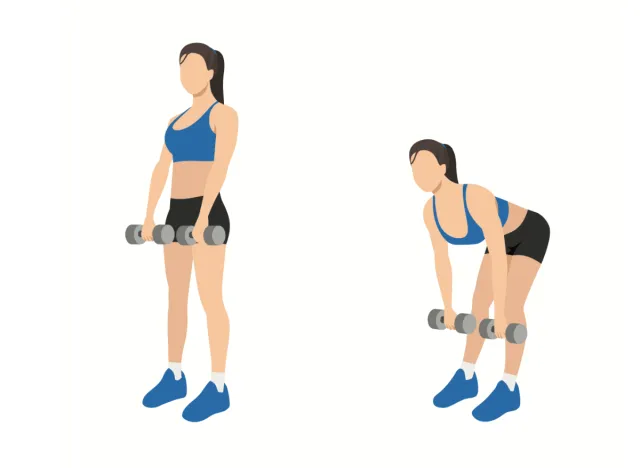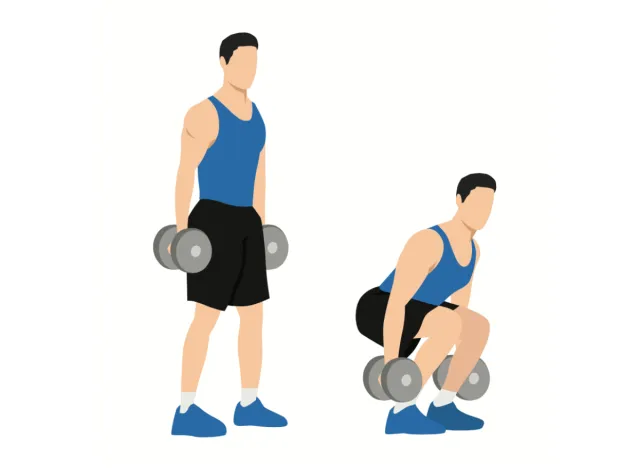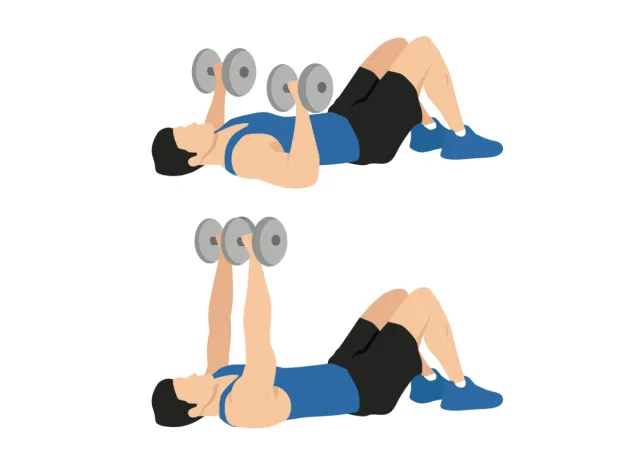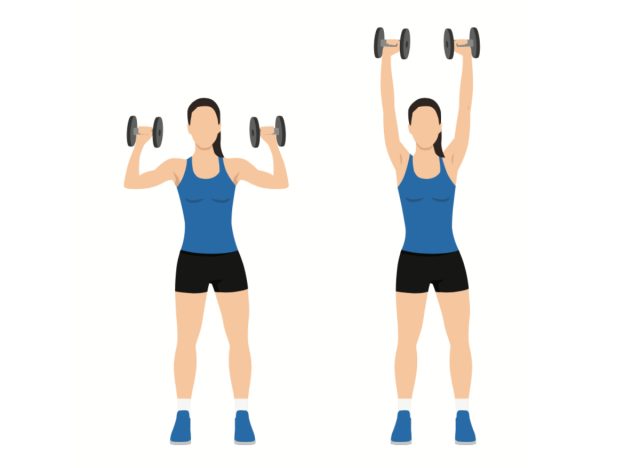Discover “The #1 Daily Workout To Prevent Muscle Loss” In addition to following a nutritious diet, strength training is one of your golden tickets to building muscle and avoiding muscle loss. That’s why Eat This, Not That! spoke with Rachel Pieroni, CPT, CNC, master instructor for Pure Barre, who walks us through her #1 daily workout to prevent muscle loss. Get ready to build up your strength!
Muscle loss is a natural part of aging; it can also happen if you lose weight, lead a more sedentary lifestyle, or don’t consume enough protein. According to Pieroni, it’s recommended that you perform strength exercises two to three times a week in order to prevent muscle loss. And remember—as with any fitness goal you’re working toward, consistency is key!

The #1 Daily Workout To Prevent Muscle Loss
“Gaining muscle and maintaining a healthy amount of muscle mass is incredibly important as we age. It has been shown to reduce all-cause mortality, prevent disease, increase recovery (post-operative), and increase overall quality of life, especially as you age,” Pieroni explains. “After the age of 30, your muscle mass tends to decline, especially if you are already sedentary. Preventing muscle loss can be less detrimental if you start strength training at a younger age, prior to 30 years old.”
Pieroni also points out that it becomes more difficult to build muscle as you age, since you’re dealing with the natural decline—but that doesn’t mean it’s impossible! Consistently striving to build upon your muscle mass and strength train is crucial at every age and stage of life. In addition, emphasizing compound lifts or movements in your strength-based workouts is key.
So if you’re ready to learn about Pieroni’s #1 daily workout to prevent muscle loss, keep reading to learn more. And when you’re finished, don’t miss out on the 7 Essential Exercises for Men To Prevent Muscle Loss After 50.


“Deadlifts are a compound movement and are highly effective in increasing functional strength,” Pieroni explains. “Generally speaking, there are two types of deadlifts; conventional and sumo. Conventional deadlifts require a more narrow stance, targeting the glutes, hamstrings, and lower back muscles. Sumo deadlifts require a wide stance, with turned-out hips, also targeting the glutes, hamstrings, and lower back, as well as the quadricep muscles and adductors, due to the turnout.”
Romanian deadlifts (RDL) are similar to performing conventional deadlifts, but they begin at the top versus at the bottom (or grabbing the weight(s) from the floor).
To get started with the RDL, hold a dumbbell in each hand, and plant your feet hip-width apart. Bend your knees just a bit, stand tall, and position the dumbbells at the front of your thighs. Then, activate your lats as you press your hips back and hinge your body forward. Make sure your back remains flat as you drag the weights just below your knees toward the floor. Then, return to the standing start position. Perform three sets of 12 reps.
Read Related Also: Beneficial Effects of Vitamin K on Bone Health – Study Reveals


“A squat is another compound movement and strength exercise,” Pieroni says. “Stances can also vary in a squat, as well as depth and range of motion. The goal is to lower your hips down toward knee level (or lower in some cases), as you create a hinge at the hips, knees, and ankles. The main muscles targeted are the glutes, quadriceps, hamstrings, hip flexors, and calves. Variations include goblet, sumo, cyclist, barbell back squat, overhead squat, etc.”
To perform squats with weights, position your feet just outside hip-width with your toes pointing forward. Hold a dumbbell in each hand with your arms at the sides of your body. Press your feet into the floor, bend your knees, and lower your glutes toward the ground. Make sure your chest stays open and lifted and your core is activated. Descend until your thighs are parallel to the floor or lower. Then, press back up to the start position. Perform three sets of 12 reps.


“[The bench press or chest press is] another compound movement targeting the chest muscles,” Pieroni says. “Typically, a barbell is used for a bench press. A chest press can utilize dumbbells or be completed in a more upright position on a machine.”
To get started with a chest press, hold a dumbbell in each hand. Lie flat on your back on the ground or on a workout bench. If you’re on the floor, bend your knees and plant your feet. If you’re on a workout bench, straddle the bench with your feet, and plant them on the ground. Make sure your back stays flat. Extend your arms, holding the weights over your chest. Slowly lower the dumbbells toward your chest, bringing them down and out to the sides of your body.
“If you are on a bench, this allows for a greater range of motion, meaning the elbows may move further down, whereas lying on the floor limits the range of motion,” Pieroni points out. Your elbows should stay under your wrists throughout the movement. After lowering the weights, drive them back up to extended arms. Perform three sets of 12 reps.


This daily workout to prevent muscle loss wraps up with the shoulder press. “Also known as the overhead press or military press, [the shoulder press] is another compound lift targeting the shoulders or deltoid muscles,” Pieroni tells us. “There are many variations, including thrusters and the Arnold press. They can be performed sitting or standing.”
Begin this final exercise by standing tall or sitting up straight and holding a dumbbell in each hand. Raise your arms to shoulder level at 90 degrees, stacking your wrists over your elbows. Your palms should face forward. Maintain a tall chest, and brace your core. Then, press the weights above your head until your arms are almost fully extended. The weights should be right over your shoulders at the top. Then, gradually lower the dumbbells by bending both elbows to return to the position you started in. Perform three sets of 12 reps.






